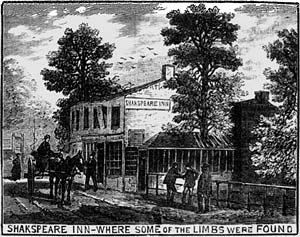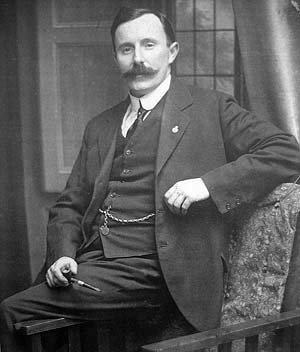
Shakespeare Inn - Bonhay Road
Page updated 3 August 2009
An application for a license for Mr Reuban Taylor, the assignee of the original lessee, in 1865, was refused on the grounds that the public house had no accommodation, and that there was no requirement for another licensed premises in the area. It is probable that the establishment opened as an unnamed beer house, for which a simple license could be purchased without going to a magistrate. However, a license to sell spirits required a license from a magistrate, and it was this that was refused.
In 1868 the license was transferred from Reuban Taylor to Charles Spiller and, again, in the same year, to Mr Slade. In 1874, Mrs Emily Slade, the wife of the former landlord was charged and found guilty of assaulting the landlord, Henry Merrifield by pulling his whiskers, for which she was fined 2s 6d.
The Shakespeare Inn was a bit player in the notorious baby farming murder in May 1879. The torso of an 8 month old baby boy was found by Edward Stookes, in the grid of the mill leat beneath Powhay Mills. The leat was drained, a search made, and the head was found at the rear of the city brewery, while the arms and legs were in the leat at the Shakespeare Inn. The body parts were taken to the Princess Alexandra Inn, just opposite Powhay. A woman named Anne Tooke was arrested, found guilty and hung in August 1879, for the child's murder in one of the most sensational trials of the 19th Century.
There was another transfer of the license in 1889 from R J Morris to Mr W J Taylor, and in the same year, Taylor was implicated in the receiving of stolen goods, namely two axles from the Francis Parkin foundry close by. He was found guilty and sentenced to three months hard labour. The next year the license was transferred from Richard John Morris to Mr Walter Bond, late of the Victoria Inn. There was a tragic sudden death in the bar in 1896, when 30 year old, Emily Budd suddenly collapsed, clutching her baby to her chest. The inquest found she had died of heart failure. In 1900, the council discussed the possibility of demolishing the Shakespeare Inn to make room for more sheep pens, as the cattle market was becoming overcrowded; the scheme was never implemented.
A trip to the slaughterhouse
The directories indicate that in 1914 the landlord was Alfred Dorothy. By 1919 Mr John William Hanson was running the place. He was married with a 17 year old daughter and 6 year old son. In January 1920 his wife gave birth, alone, to a second daughter while he was away from the premises. Exhausted by her labour she could not even cover the baby, which was very weak. Thinking she would not survive, the child was quickly baptised. She hung on and survived to have a family of her own.
Years later, as an old woman, she related to her family of the time when she looked out of the inn's window, when it was raining hard, to see a man calmly floating down the river holding an open umbrella above his head! John Hanson was also a butcher, and as a treat he took his youngest daughter to see the slaughter house at Exe Island – a treat the girl never forgot, as she had an aversion to meat for the rest of her life. Her father, played cricket and was hit on the shin by the ball – the injury refused to heal and turned cancerous. His leg was amputated below the knee, then above the knee, and he eventually died in 1929. The family left the Shakespeare Inn by 1926 and moved away.
By 1926, William Baker was landlord. The last landlord to run the Shakespeare Inn was Jim Guppy. In 1967, it was demolished for road widening for the construction of the northern Exe bridge. Renslade House now sits on the site of the Shakespeare Inn, and its neighbour, the Cattle Market Inn.
Sources: Flying Post, trade directories, Sally Chewter for the Hanson family memories and Dick Passmore.

A rather lurid picture of the
Shakespeare Inn from the Illustrated Police News, 1879.
John
William Hanson – landlord in 1920. Courtesy Sally Chewter.
│ Top of Page │